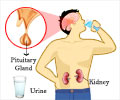Vasopressin should be used with great caution for the treatment of hypotension in septic shock, according to results from an international research team published.
Vasopressin should be used with great caution for the treatment of hypotension in septic shock, according to results from an international research team published today in the online open access journal Critical Care. Their experiments -- conducted in pigs -- show it can significantly reduce blood flow to vital organs.
Vasopressin should be used with great caution for the treatment of hypotension in septic shock, according to results from an international research team published today in the online open access journal Critical Care. Their experiments - conducted in pigs - show it can significantly reduce blood flow to vital organs.The peptide hormone vasopressin is being developed as a new therapy for the hemodynamic support of septic shock and vasodilatory shock due to systemic inflammatory response syndrome.
Previously, the compound has been shown to increase blood pressure in septic shock that fails to respond to catecholamines. However, the safety of vasopressin treatment in humans with septic shock is yet to be proven. Now, researchers in Iceland, Switzerland, and the US, have tested the effects of vasopressin on pancreatic, renal, and hepatic perfusion in pigs and discovered that the compound causes severe disturbances in blood flow in these organs.
Dr Vladimir Krejci of the Department of Anesthesiology, Washington University School of Medicine, in St. Louis, Missouri, and colleagues investigated the effects of vasopressin on pigs divided into in four groups. Group S (sepsis) and group SV (sepsis/vasopressin) were exposed to fecal peritonitis, while Group C and Group V were non-septic controls. The team measured regional blood flow in the hepatic and renal arteries, the portal vein, and the celiac trunk by means of ultrasonic transit time flowmetry.
They found that in septic shock, vasopressin markedly decreased blood flow (by 58%) in the portal vein within an hour, and even after three hours the reduction stood at 45%. Flow was unchanged in the hepatic artery and increased in the celiac trunk, but was unchanged in the liver. Microcirculatory blood flow in the pancreas also fell considerably and, to a lesser extent, in the kidney. The investigation also revealed that increased urine output does not necessarily reflect increased renal blood flow and so may not be a useful indicator of the effects of a particular treatment.
Source-Eurekalert
MAR/P








